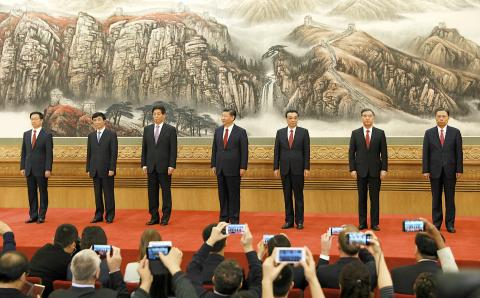The Chinese Communist Party (CCP) yesterday elevated five new officials to assist Chinese President Xi Jinping (習近平) as he embarks on a second five-year term as CCP secretary-general, and by stopping short of designating an obvious successor strengthened his position as the country’s most powerful leader in decades.
As expected, Xi was given a renewed mandate following the first meeting yesterday of the new CCP Central Committee that was elected at the party’s twice-a-decade national congress.
“We will mobilize the whole party and the whole country in a resolute push to deliver on our pledge and eradicate poverty in China,” Xi said in comments to reporters at a brief ceremony at the Great Hall of the People.

Photo: EPA-EFE
Five members of the new seven-strong Politburo Standing Committee introduced by Xi were appointed yesterday. Going by the party’s norms on retirement ages, none of them are deemed suitable to succeed the 64-year-old Xi as party leader after his second five-year term.
The absence of an obvious successor pointed to Xi’s long term ambitions, said Joseph Fewsmith, an expert on Chinese politics at Boston University.
“It suggests that Xi will likely serve a third term, and that he is likely to name his own successor,’’ Fewsmith said. “We have not seen that for two decades.’’
In contrast, before Xi took power in 2012, he had been in the Standing Committee for five years.
Xi’s predecessor, Hu Jintao (胡錦濤), had a seat in the body for 10 years before becoming CCP leader.
Under recent party precedent, party leaders have served just two five-year terms.
The party had already elevated Xi’s status on Tuesday at its closing session by inserting his name and dogma into the party’s constitution alongside past leaders Mao Zedong (毛澤東) and Deng Xiaoping (鄧小平).
“No one doubts Xi bestrides the landscape like a colossus. Organized or even unorganized resistance is inconceivable,” said Jeremy Paltiel, a China expert at Canada’s Carleton University.
The only other returning member to the apex ruling body was Chinese Premier Li Keqiang (李克強), the party’s No. 2 official primarily responsible for overseeing the economy and leading the Cabinet.
Li’s authority was widely viewed as having been undercut by Xi’s accumulation of power across various sectors of government.
The makeup of the committee reflects Xi’s efforts to foster party unity by striking a balance between different interest groups in the 89-million member organization.
The new members of the Politburo Standing Committee are, in order of seniority: Li Zhanshu (栗戰書), who serves as Xi’s chief of staff; Vice Premier Wang Yang (汪洋); Wang Huning (王滬寧), director of the party’s Central Policy Research Office; Zhao Leji (趙樂際), head of party organization responsible for job assignments; and Shanghai CCP leader Han Zheng (韓正).

CHIPMAKING INVESTMENT: J.W. Kuo told legislators that Department of Investment Review approval would be needed were Washington to seek a TSMC board seat Minister of Economic Affairs J.W. Kuo (郭智輝) yesterday said he received information about a possible US government investment in Taiwan Semiconductor Manufacturing Co (TSMC, 台積電) and an assessment of the possible effect on the firm requires further discussion. If the US were to invest in TSMC, the plan would need to be reviewed by the Department of Investment Review, Kuo told reporters ahead of a hearing of the legislature’s Economics Committee. Kuo’s remarks came after US Secretary of Commerce Howard Lutnick on Tuesday said that the US government is looking into the federal government taking equity stakes in computer chip manufacturers that

POWER PLANT POLL: The TPP said the number of ‘yes’ votes showed that the energy policy should be corrected, and the KMT said the result was a win for the people’s voice The government does not rule out advanced nuclear energy generation if it meets the government’s three prerequisites, President William Lai (賴清德) said last night after the number of votes in favor of restarting a nuclear power plant outnumbered the “no” votes in a referendum yesterday. The referendum failed to pass, despite getting more “yes” votes, as the Referendum Act (公民投票法) states that the vote would only pass if the votes in favor account for more than one-fourth of the total number of eligible voters and outnumber the opposing votes. Yesterday’s referendum question was: “Do you agree that the Ma-anshan Nuclear Power Plant

Chinese Nationalist Party (KMT) lawmakers have declared they survived recall votes to remove them from office today, although official results are still pending as the vote counting continues. Although final tallies from the Central Election Commission (CEC) are still pending, preliminary results indicate that the recall campaigns against all seven KMT lawmakers have fallen short. As of 6:10 pm, Taichung Legislators Yen Kuan-heng (顏寬恒) and Yang Chiung-ying (楊瓊瓔), Hsinchu County Legislator Lin Szu-ming (林思銘), Nantou County Legislator Ma Wen-chun (馬文君) and New Taipei City Legislator Lo Ming-tsai (羅明才) had all announced they

Nvidia Corp CEO Jensen Huang (黃仁勳) yesterday visited Taiwan Semiconductor Manufacturing Co (TSMC, 台積電), as the chipmaker prepares for volume production of Nvidia’s next-generation artificial intelligence (AI) chips. It was Huang’s third trip to Taiwan this year, indicating that Nvidia’s supply chain is deeply connected to Taiwan. Its partners also include packager Siliconware Precision Industries Co (矽品精密) and server makers Hon Hai Precision Industry Co (鴻海精密) and Quanta Computer Inc (廣達). “My main purpose is to visit TSMC,” Huang said yesterday. “As you know, we have next-generation architecture called Rubin. Rubin is very advanced. We have now taped out six brand new